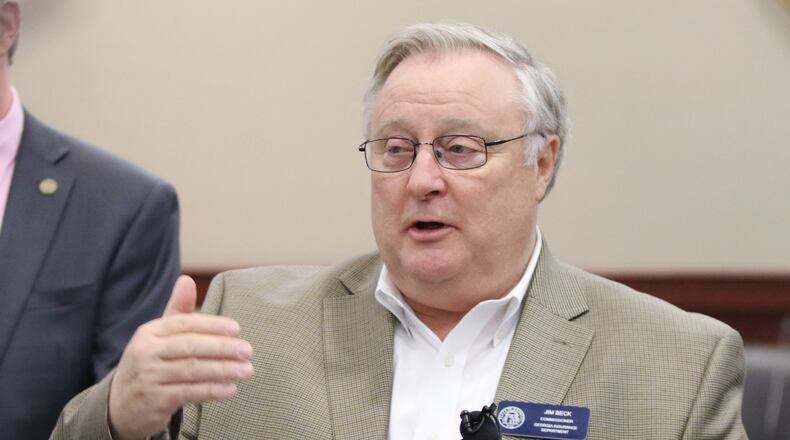Jimmy Claude Beck Sr.’s first campaign report in February of 2018 showed he’d raised $1 million in a few months, and like most politicians would, he bragged about it in a press release, promising to be an insurance commissioner “who is accountable to the people of Georgia and not the special interests.”
What the release didn’t say was that almost all the money came from loans and contributions Beck made to his own campaign.
According to a 38-count indictment released last week, some of that money may have been fraudulently obtained. Federal prosecutors say at least some of it came from an elaborate scheme to steal $2 million from his former employer.
The Atlanta Journal-Constitution reviewed the federal criminal charges against Beck, his financial disclosure reports and nearly 1,000 contributions to his campaign to see how he bankrolled his winning bid to become insurance commissioner.
Beck raised relatively little money — beyond his own — to win the Republican primary, besting, among others, the insurance industry’s favored candidate.
Once he won the primary, checks from insurers came rolling in, including from people such as former Insurance Commissioner John Oxendine, who paid for a fundraiser. At least nine board members of the company he is accused of defrauding, the Georgia Underwriting Association, also donated, mostly after the primary.
Among those board members were then-Gwinnett County state Sen. David Shafer and then-state Rep. Rick Golick, a lawyer for Allstate Insurance and a longtime Smyrna legislator.
Federal prosecutors say the scheme continued into last summer, at least two months after Beck won the primary but before the general election, when he beat insurance agent Janice Laws, a Democrat, by 3 percentage points. Beck spent about $27 for every $1 Laws did running for insurance commissioner.
Beck denied the accusations and noted the large profits the organization he is accused of defrauding made under his leadership. “I am, in fact, innocent of these charges,” he said in a letter to Gov. Brian Kemp, asking to be suspended while he mounted a legal defense. Kemp suspended Beck from office Thursday. He will retain his $120,000-a-year state salary as a commissioner while suspended.
William Perry of Georgia Ethics Watchdogs said the allegations of money being funneled into the “Jim Beck for Georgia Inc.” campaign fund were “pretty shocking.”
“I have never heard of a campaign funded with money that somebody embezzled,” Perry said. “Usually they are moving it offshore or buying lavish things, not paying for a political campaign.”
Not the industry candidate
Besides running the Georgia Underwriting Association — a state-created marketplace that provides high-risk property insurance to Georgia homeowners having trouble getting coverage — Beck entered the race for commissioner with a wealth of political and insurance agency experience.
He served as press secretary to Lt. Gov. Pierre Howard in the 1990s and was long head of the Georgia Christian Coalition, lobbying lawmakers at the Capitol. He also served in the administrations of his two predecessors in the commissioner’s office: Oxendine and Ralph Hudgens.
When Hudgens announced in 2017 that he wouldn’t run for a third term, Beck was among a handful of people who publicly expressed interest in the race. The state insurance commissioner regulates insurance companies, oversees the small loan industry and acts as the state’s top fire marshal.
Under Hudgens, drivers consistently saw some of the largest auto insurance rate hikes in the country. As is often the case among commissioners, he was criticized for being too cozy with the industry he regulated. Beck was one of several candidates in the race to replace Hudgens who said that needed to change.
“What I am trying to do is assure people that the status quo is not acceptable,” Beck told the AJC in April 2018, a month before the primary.
Hudgens backed Jay Florence, his deputy commissioner. Many of his insurance industry supporters donated to Florence’s campaign. Beck described Hudgens’ endorsement as “like the captain of the Titanic recommending the first mate and him saying I know what it’s like to run a good ship.”
A third Republican, Tracy Jordan, a pharmacist, Realtor and former Hoschton city councilwoman, entered the race as well but with limited funding.
In Beck’s first campaign disclosure — which ran through Jan. 31, 2018 — he reported raising $1.15 million. Of that, $741,250 came in the form of a loan, according to disclosure reports.
Of the $408,280 in large contributions he took in, $332,000 came from his own pocket. He also listed $24,000 worth of in-kind expenses for things such as T-shirts and mileage.
He had enough money to donate to the Faith & Freedom Coalition, the Christian Sportsman Inc., the Cobb County Republican Woman’s Club and to pay for a table at a Floyd County Republican Party event.
A month later, he filed a personal financial disclosure that showed a net worth of $3.7 million, no liabilities and a 2017 salary of $250,000, with nearly $500,000 in total income.
A folksy, self-effacing campaigner, Beck traveled the state, attending rallies, lunches and dinners, speaking at big events and small. He raised relatively little money between February and the May primary, with most of the campaign checks that typically fund insurance commissioner races going to Florence.
News outlets, including the AJC, reported that he’d held full-time state and private-sector jobs at the same time in his past, and that a suspicious fire had burned down one of his rental properties.
But the stories never gained enough traction to harm him at the polls. Beck won almost 60% of more than 500,000 votes cast in the primary, easily besting Florence and Jordan.
Attempts to reach Florence last week were unsuccessful. Jordan said all she knew about Beck’s case was what she’d read in the news media and would say only that she was proud to have not taken insurance industry contributions. She indicated she might run again for something in the future. “I was proud we didn’t burn any bridges,” she said.
Money flows post-primary
The AJC reported in June that a federal grand jury had subpoenaed Beck’s work records with the state.
Many in the insurance industry got on board with Beck after he won the primary. Reports list Oxendine donating $6,600 on the day of the primary. He spent $2,000 on a June fundraiser for Beck, and he donated $6,600 more in September, disclosures show. Oxendine is currently battling the state ethics commission over old charges that he took illegal donations when he was running for governor in 2010 and newer complaints that he illegally benefited personally from leftover campaign money. The cases are pending, and Oxendine has accused the commission of wasting taxpayers’ money going after him.
Other insurance industry officials joined in giving to Beck, including most members of the board overseeing the Georgia Underwriting Association.
Jerome Guiney, the chairman of the association board and a regional vice president of Hanover Insurance, contributed $926 in cash and food in October, according to Beck’s campaign reports. Guiney last week said in a statement that the association has “cooperated fully” with the U.S. Attorney’s Office and FBI.
“None of the other officers, directors or employees of the association have been implicated in the alleged crime,” he said. “In light of our ongoing cooperation with the authorities, we have asked our directors and employees to make no comment beyond this statement.”
Golick, the longtime Republican lawmaker, donated $2,500 in July.
“Having been unaware at the time of what has recently been brought to light, I supported the candidate at that time who would bring the most substantive experience to the position,” said Golick, who also previously donated to Beck’s Republican predecessors, Oxendine and Hudgens.
Shafer, who was executive director of the Georgia Republican Party around the same time Beck worked for the Democratic lieutenant governor — Howard — gave $5,000 in September. He and his wife contributed an additional $2,100 to Beck in January of this year. Beck had contributed $6,600 — the maximum for the primary — to Shafer’s campaign for lieutenant governor. Shafer lost the Republican runoff in July.
Shafer said, “I supported him not because I served on the board but because I supported Republican candidates.”
Beck also continued to put his own money into the race. He reported spending about $15,000 on postage, office supplies, food for fundraisers, and several more organization sponsorships. He borrowed an additional $250,000 for the general election campaign.
He’d raised enough by late October — just before the general election — to begin paying back the loans. By the end of the year, according to his campaign reports, he’d paid back almost $400,000 to United Community Bank in Carrollton. As of his most recent report, through Jan. 31, his campaign still owed $500,000.
Like Perry, Sara Henderson of Common Cause Georgia, a government watchdog group, said she can’t think of another example where someone was charged with using embezzled money to fund a campaign. But Beck is also an example of someone who was able to use his own money — no matter how it was raised — to win an election, something that is much more common.
“The Supreme Court has shot down (limits) so many times,” she said. “You can’t tell somebody how to spend their own money.”
Stay on top of what’s happening in Georgia government and politics at www.ajc.com/politics.
About the Author
Keep Reading
The Latest
Featured



